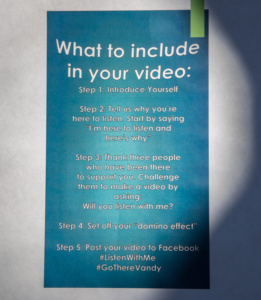There is no shortage of dialogue about mental health on campus. The Chancellor’s Office and Vanderbilt Student Government have both facilitated dialogue on the subject in an attempt to create a healthier campus culture. The “Go There” campaign provides a forum for students to break the stigma surrounding mental health and getting help. The Hustler has a column dedicated to mental health issues. This year, the Psychological Counseling Center is being transitioned into the University Counseling Center to better accommodate the new short term model of care.
However, several Vanderbilt undergraduates saw the potential for mental health awareness to spread through another platform: social media.
“It originally got started with a small group of people just thinking about mental health on campus and really wanting to, you know, promote more open conversation,” said Kyle Gavulic, one of the students who was part of the inception of the campaign.
Gavulic describes the founders of “Listen With Me” as a group of friends, many of whom had personally dealt with mental health challenges. Since the campaign’s inception, the student leader have been collaborating with the Chancellor’s “Go There” initiative, VSG’s Mental Health Roundtable and the Center for Student Wellbeing’s Imperfection Project.
To spread the word about de-stigmatizing mental health, Listen With Me is asking students to create sixty to ninety-second videos featuring a domino effect of some sort. If you would like to make a video, here are a few helpful guidelines. You should start with the phrase, “I’m here to listen, and here’s why,” before explaining why you support mental health awareness. You should then thank three people who have supported you, and challenge those three people to make a video as well with the words, “Will you listen with me?”. Finally, set off your domino effect. Videos should be posted to Facebook with the hashtags #ListenWithMe and #GoThereVandy.

Gavulic hopes that Listen With Me will ultimately encourage Vanderbilt students to stop covering up their mental health challenges, and openly discuss them with others.
“We’re just putting that ‘perfect self’ out, when really we’re all human and we should be talking about or mental health like we talk about our physical health,” he said.



